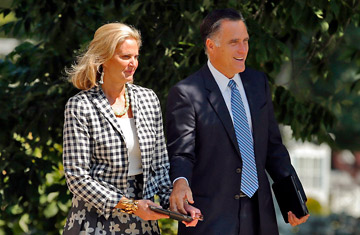
Romney and his wife Ann leave the Church of Jesus Christ of Latter-day Saints near their lake house in Wolfeboro, N.H.
On the eve of America's bicentennial in 1976, a leading authority of the Church of Jesus Christ of Latter-day Saints rose to speak at the Mormons' biannual General Conference in Salt Lake City. "Can we maintain our basic freedoms, peace and prosperity for another 200 years?" he asked, rhetorically, before continuing, "The answer to this question is yes, if we shall individually repent and conform to the laws of the God of this land, who is Jesus Christ."
The sermon that followed was titled "America's Destiny." Its preacher was Marion G. Romney, a member of the Mormon elite and cousin of former Michigan governor George Romney and of Mitt Romney. The Salt Lake address and a follow-up speech the next spring at Brigham Young University neatly captured the Mormon vision of America's special role in sacred and secular history--a vision that greatly expands the traditional Protestant view of America as a new promised land.
According to Mormon founder Joseph Smith, the U.S. is the terrestrial home of the Garden of Eden and the place where a resurrected Jesus appeared to restore the gospel and where he will come again--in Jackson County, Missouri. "What is largely metaphorical for many Protestants is literal for many Mormons," says Matthew Bowman, a historian of Mormonism at Hampden-Sydney College. At BYU, Marion Romney spoke of America's "final, great and glorious destiny. Here Zion is to be established and the New Jerusalem is to be built. From here the law of God shall go forth to all nations."
It's tempting to think of Mitt Romney's faith as that of John Winthrop on steroids--that the Republican presidential nominee's religious tradition exalts America above all other nations, creating an exceptionalism that could invest American policy with a sense of divine sanction or lead to theocracy. Even the title of Romney's 2010 book--No Apology: The Case for American Greatness--doesn't allow for much nuance. Yet the political implications of the Mormon understanding of American destiny are not so simple. The story of the faith of Romney's ancestors on the American continent is one of exile and redemption, of blessing and punishment and, perhaps above all, of struggle and endurance amid trial and tribulation.
Which, when you think about it, is a pretty fair description of a close-fought presidential campaign. At the moment, for his supporters and opponents, Romney remains more a political caricature than a character from real life. There is Romney the Plutocrat, the man who can seemingly dismiss 47% of the country because they are "dependent upon government." There is Romney the Turnaround Artist, the man who should be trusted with the fortunes of a troubled nation. There is Romney the Secretive, the man who keeps his tax returns close to hand. And last week, Senator Harry Reid of Nevada, the Democratic majority leader, who is also a Mormon, added a new one to the mix: Romney the Unrepresentative Mormon. Reid told reporters that Romney has "sullied" his faith and "is not the face of Mormonism."
